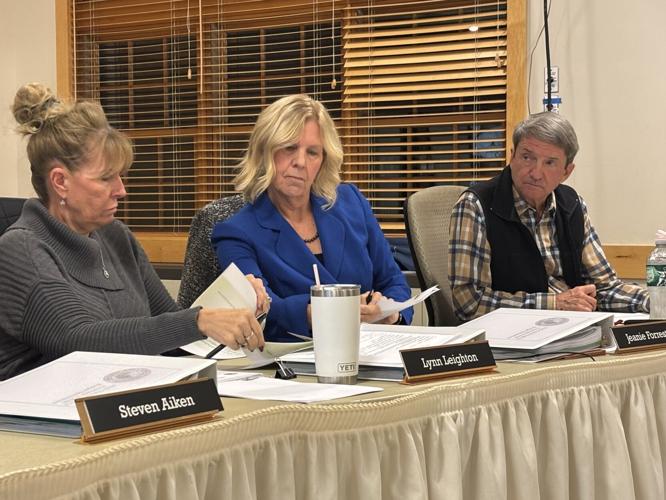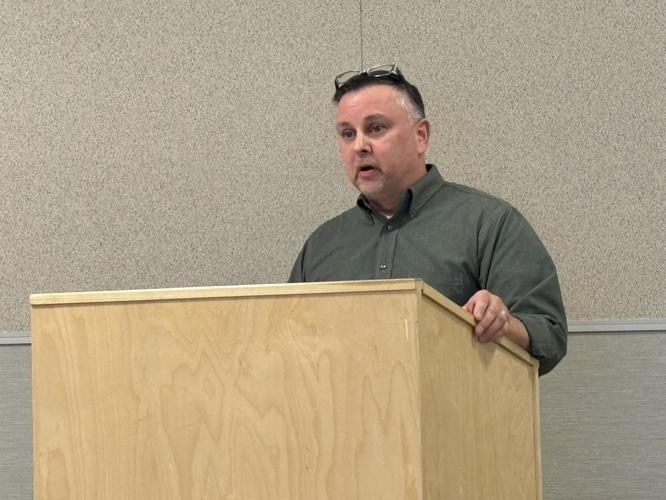MEREDITH — The town Selectboard voted to use money from the town’s “rainy day fund” to lower the proposed tax rate, set at $10.62 per thousand, a 3.51% increase over last year.
This figure decreased from the initial proposed rate of $10.80, after the selectboard unanimously voted to use $709,150 from the town’s fund balance to reduce the municipal portion by $0.18 during their meeting Monday.
“My calculation is the municipal rate will drop to $3.44, from the attached $3.62,” Town Manager Judie Milner said in an email on Wednesday that included tax rate calculations.
Robert Carpenter, the town's director of administrative services, said during Monday’s selectboard meeting the total appropriation from Town Meeting was $22.9 million, and revenue for the year amounted to just under $9 million. Documents from the state Department of Revenue Administration show that adding in the war service credits of $312,125, and the overlay total of $60,102, and then incorporating the fund balance amount, the final local tax effort is $13.58 million.
The municipal tax bill, combined with the county ($4 million), local education ($19.5 million), and the state education ($4.7 million) totals $42.5 million, which goes against the valuation, of about $3.94 billion.
Prior to the vote on using the fund balance to cover a portion, Carpenter said the tax rate included the municipal tax rate of $3.62, county tax rate of $1.03, local education rate of $4.95, and state education of $1.20, for a total rate of $10.80.
This would have been an increase of $0.54, or a 5.2% increase over the past year, but using the fund balance dropped the municipal rate, for a $0.36 increase instead. Town leaders only have control over the municipal portion of the tax rate.
The town has a policy of keeping 8%-17% of the budget in the fund balance, and has always been in the 12%-15% range. Before the vote, the fund balance was $6.5 million, or 13.47%. Carpenter said this put the town in a good spot, and therefore did not recommend using the fund balance to lower the tax rate.
“However, the choice is yours,” Carpenter said. “You know where we sit. Last year, we were doing this later in the year, in December, and we had the ability to kind of foresee how much we wouldn’t spend before the end of the year.”
Town leaders have until February to finalize the budget before a public hearing, and can look to fund some of the expendable trust fund expenses through the unassigned fund balance, knowing more about appropriations at the end of the year. That will help fund projects coming through with the Capital Improvements Committee.
“We have plenty of time to look at some of those things, but as far as the tax rate goes, I wouldn’t recommend using any of that 13.47% to lower the tax rate,” Carpenter said.
Carpenter added the decision needed to be made during that meeting in order to be timely in getting tax bills out. However, despite his recommendation, the board decided they were in a good position to do so.
Selectboard member Steve Aiken noted the municipal tax rate has been reduced the last three years, and Carpenter said last year they thought the municipal portion was going to be at $3.77. Carpenter said that it is still $0.15 below what they thought it would be during the budget exercise last year.
Selectboard member Mike Pelczar said 12% of the fund balance is always what the board strives for, and he recommended using that money to decrease the tax rate.
Aiken said the choice is to either hold on to the dollars, or ultimately go to the town and ask for it. He said 12% has been a good figure for the past few years, and he would also recommend using the fund balance. Selectboard member Jeanie Forrester agreed, and Pelczar reiterated his desire to use the funds.
Carpenter said he will adjust the rate, keeping 12% of the budget in the fund balance, which Milner referred to as the “rainy day fund.” This move leaves $5.8 million to be used for emergencies.
“We are putting a little bit back in the tax rate bucket to lower the tax bill by a few pennies,” Aiken said. “But a few pennies is a few pennies.”
Meredith resident Anne Sprague went to the podium to ask for clarification of the process, and replied to Aiken, “When some people pay $20,000 a year in taxes, they will probably appreciate those pennies.”
Carpenter said it takes about two weeks to complete the process with state DRA staff, and as soon as the rate is posted and the bills are sent out, they will also be available as online statements, so residents can pay accordingly.



















(0) comments
Welcome to the discussion.
Log In
Keep it Clean. Please avoid obscene, vulgar, lewd, racist or sexually-oriented language.
PLEASE TURN OFF YOUR CAPS LOCK.
Don't Threaten. Threats of harming another person will not be tolerated.
Be Truthful. Don't knowingly lie about anyone or anything.
Be Nice. No racism, sexism or any sort of -ism that is degrading to another person.
Be Proactive. Use the 'Report' link on each comment to let us know of abusive posts.
Share with Us. We'd love to hear eyewitness accounts, the history behind an article.